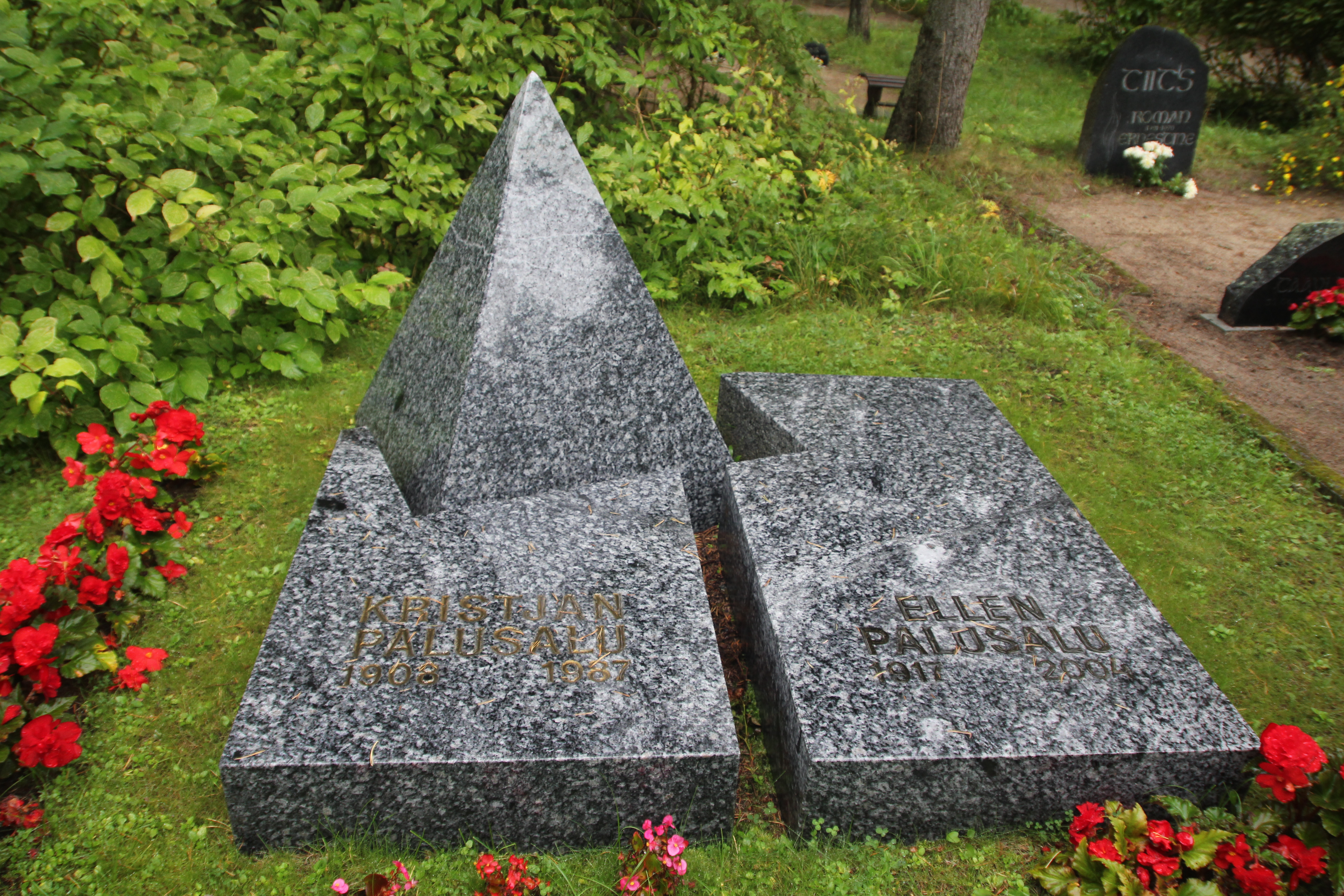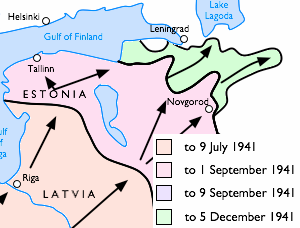|
Kristjan Palusalu
Kristjan Palusalu (until 1935 Kristjan Trossmann, – 17 July 1987) was an Estonian heavyweight wrestler and Olympic winner. Palusalu became the first and only wrestler in Olympic history ever to win both the Greco-Roman and freestyle heavy weight events. Palusalu was born in Varemurru village, Saulepi Parish, Lääne County (now Matsi village, Lääneranna Parish, Pärnu County) as one of eight children to Jüri and Liisu Trossmann. He is best remembered for winning two gold medals at the 1936 Olympic Games in Berlin. He was given the honor of carrying the Estonian flag to Olympiastadion. The triumph was celebrated across Estonia with Palusalu and other Estonian athletes touring the country by rail giving speeches. A third of the inhabitants of Tallinn turned out to greet him and the Estonian government granted him a farm. After the Soviet Union occupied Estonia in 1940, Palusalu was sent to hard labour in Kotlas, Russia in 1941. He tried to escape with other prisoners but ... [...More Info...] [...Related Items...] OR: [Wikipedia] [Google] [Baidu] |
Wrestling At The 1936 Summer Olympics
At the 1936 Summer Olympics, 14 wrestling events were contested, all for men. There were seven weight classes in Greco-Roman wrestling and seven classes in freestyle wrestling. Medal table Medal summary Freestyle Greco-Roman Participating nations A total of 200 wrestlers from 29 nations competed at the Berlin Games: * * * * * * * * * * * * * * * * * * * * * * * * * * * * * See also *List of World and Olympic Champions in men's freestyle wrestling *List of World and Olympic Champions in Greco-Roman wrestling References {{DEFAULTSORT:Wrestling At The 1936 Summer Olympics 1936 Summer Olympics events 1936 1936 Events January–February * January 20 – George V of the United Kingdom and the British Dominions and Emperor of India, dies at his Sandringham Estate. The Prince of Wales succeeds to the throne of the United Kingdom as King E ... 1936 in sport wrestling ... [...More Info...] [...Related Items...] OR: [Wikipedia] [Google] [Baidu] |
Matsi, Pärnu County
Matsi is a village in Lääneranna Parish, Pärnu County, in southwestern Estonia, on the coast of the Gulf of Riga. It has a population of 17 (as of 1 January 2011). Orasaare Manor (''Orrasaar''), support manor of Saulepi manor, was located in Matsi. Heavyweight wrestler and Olympic winner Kristjan Palusalu Kristjan Palusalu (until 1935 Kristjan Trossmann, – 17 July 1987) was an Estonian heavyweight wrestler and Olympic winner. Palusalu became the first and only wrestler in Olympic history ever to win both the Greco-Roman and freestyle heavy wei ... (1908–1987), was born in Varemurru village which is now part of Matsi village. References External linksWebsite of Saulepi region(Kulli, Maade, Matsi, Õhu, Rädi, Raespa, Saare, Saulepi and Vaiste villages) Villages in Pärnu County Kreis Wiek {{pärnu-geo-stub ... [...More Info...] [...Related Items...] OR: [Wikipedia] [Google] [Baidu] |
Berlin
Berlin ( , ) is the capital and largest city of Germany by both area and population. Its 3.7 million inhabitants make it the European Union's most populous city, according to population within city limits. One of Germany's sixteen constituent states, Berlin is surrounded by the State of Brandenburg and contiguous with Potsdam, Brandenburg's capital. Berlin's urban area, which has a population of around 4.5 million, is the second most populous urban area in Germany after the Ruhr. The Berlin-Brandenburg capital region has around 6.2 million inhabitants and is Germany's third-largest metropolitan region after the Rhine-Ruhr and Rhine-Main regions. Berlin straddles the banks of the Spree, which flows into the Havel (a tributary of the Elbe) in the western borough of Spandau. Among the city's main topographical features are the many lakes in the western and southeastern boroughs formed by the Spree, Havel and Dahme, the largest of which is Lake Müggelsee. Due to its l ... [...More Info...] [...Related Items...] OR: [Wikipedia] [Google] [Baidu] |
Kristjan Palusalu Haud 20110906 By Ahsoous
Kristjan is a masculine given name in the Estonian language and Slovenian language. It is a variation of the name Christian. Notable people named Kristjan include: * Kristjan Čujec (born 1988), Slovenian futsal player * Kristjan Fajt (born 1982), Slovenian professional road bicycle racer * Kristjan Gregorič (born 1989), Slovenian track cyclist * Kristjan Glibo (born 1982), German football defender and manager * Kristjan Haho (1877–1937), Estonian lawyer, judge and politician * Kristjan Ilves (born 1996), Estonian Nordic combined skier * Kristjan Järvan (born 1990), Estonian politician * Kristjan Järvi (born 1972), Estonian-American conductor * Kristjan Niels Julius (1860–1936), Icelandic-American satirical poet * Kristjan Kais (born 1976), Estonian beach volleyball player * Kristjan Kaljurand (born 1992), Estonian male badminton player * Kristjan Kangur (born 1982), Estonian basketball player * Kristjan Kitsing (born 1990), Estonian basketball player * Kristjan Kõlj ... [...More Info...] [...Related Items...] OR: [Wikipedia] [Google] [Baidu] |
Occupation Of Estonia By Nazi Germany
During World War II, in the course of Operation Barbarossa, Nazi Germany invaded Estonia in July–December 1941, and occupied the country until 1944. Estonia had gained independence in 1918 from the then warring German and Russian Empires. However, in the wake of the August 1939 Nazi-Soviet Pact, the Stalinist Soviet Union had invaded and occupied Estonia in June 1940, and the country was formally annexed into the USSR in August 1940. Initially, in the summer of 1941, the German invaders were perceived by most Estonians as liberators from the Soviet terror, having arrived only a week after the mass deportation of tens of thousands of people from Estonia and other territories that had been occupied by USSR in 1939–1941: eastern Poland, Latvia, Lithuania, Bessarabia and Northern Bukovina. Although hopes were raised for the restoration of Estonia's independence, it was soon realized that Germans were but another occupying power. The Nazi German authorities exploited occu ... [...More Info...] [...Related Items...] OR: [Wikipedia] [Google] [Baidu] |
Heikki Savolainen (gymnast)
Heikki Ilmari Savolainen (28 September 1907 – 29 November 1997) was a Finnish artistic gymnast. He competed in five consecutive Olympics from 1928 to 1952 and won at least one medal in each of them. In 1928, he won a bronze on pommel horse, which was the first-ever medal in gymnastics for Finland. Winning his last medal at the 1952 Summer Olympics in Helsinki, he became the oldest gymnastics medalist, at 44 years old; he delivered the Olympic Oath in the opening ceremony of those games. olympic.org In 1932, Savolainen and his teammate had the same score on |
Lake Onega
Lake Onega (; also known as Onego, rus, Оне́жское о́зеро, r=Onezhskoe ozero, p=ɐˈnʲɛʂskəɪ ˈozʲɪrə; fi, Ääninen, Äänisjärvi; vep, Änine, Änižjärv) is a lake in northwestern Russia, on the territory of the Republic of Karelia, Leningrad Oblast and Vologda Oblast. It belongs to the basin of the Baltic Sea, and is the second-largest lake in Europe after Lake Ladoga, slightly smaller than Lebanon. The lake is fed by about 50 rivers and is drained by the Svir. There are about 1,650 islands on the lake. They include Kizhi, which hosts a historical complex of 89 Orthodox churches and other wooden structures of the 15th–20th centuries. The complex includes a UNESCO World Heritage site, Kizhi Pogost. The eastern shores of the lake contain about 1,200 petroglyphs (rock engravings) dated to the 4th–2nd millennia BC, which have also been inscribed as a UNESCO World Heritage site. The major cities on the lake are Petrozavodsk, Kondopoga and Medvezhye ... [...More Info...] [...Related Items...] OR: [Wikipedia] [Google] [Baidu] |
Karelia
Karelia ( Karelian and fi, Karjala, ; rus, Каре́лия, links=y, r=Karélija, p=kɐˈrʲelʲɪjə, historically ''Korjela''; sv, Karelen), the land of the Karelian people, is an area in Northern Europe of historical significance for Russia (including the Soviet era), Finland, and Sweden. It is currently divided between northwestern Russia (specifically the federal subjects of the Republic of Karelia and Leningrad Oblast) and Finland (the regions of South Karelia, North Karelia, and the eastern portion of modern-day Kymenlaakso). Use of name Various subdivisions may be called Karelia. Finnish Karelia was a historical province of Finland, and is now divided between Finland and Russia, often called just ''Karjala'' in Finnish. The eastern part of this chiefly Lutheran area was ceded to Russia after the Winter War of 1939–40. The Republic of Karelia is a Russian federal subject, including East Karelia with a chiefly Russian Orthodox population. Within present-da ... [...More Info...] [...Related Items...] OR: [Wikipedia] [Google] [Baidu] |
Continuation War
The Continuation War, also known as the Second Soviet-Finnish War, was a conflict fought by Finland and Nazi Germany against the Soviet Union from 1941 to 1944, as part of World War II.; sv, fortsättningskriget; german: Fortsetzungskrieg. According to Finnish historian Olli Vehviläinen, the term 'Continuation War' was created at the start of the conflict by the Finnish government, to justify the invasion to the population as a continuation of the defensive Winter War and separate from the German war effort. He titled the chapter addressing the issue in his book as "Finland's War of Retaliation". Vehviläinen asserted that the reality of that claim changed when the Finnish forces crossed the 1939 frontier and started annexation operations. The US Library of Congress catalogue also lists the variants War of Retribution and War of Continuation (see authority control)., group="Note" In Soviet historiography, the war was called the Finnish Front of the Great Patriotic War.. Alter ... [...More Info...] [...Related Items...] OR: [Wikipedia] [Google] [Baidu] |
Russia
Russia (, , ), or the Russian Federation, is a List of transcontinental countries, transcontinental country spanning Eastern Europe and North Asia, Northern Asia. It is the List of countries and dependencies by area, largest country in the world, with its internationally recognised territory covering , and encompassing one-eighth of Earth's inhabitable landmass. Russia extends across Time in Russia, eleven time zones and shares Borders of Russia, land boundaries with fourteen countries, more than List of countries and territories by land borders, any other country but China. It is the List of countries and dependencies by population, world's ninth-most populous country and List of European countries by population, Europe's most populous country, with a population of 146 million people. The country's capital and List of cities and towns in Russia by population, largest city is Moscow, the List of European cities by population within city limits, largest city entirely within E ... [...More Info...] [...Related Items...] OR: [Wikipedia] [Google] [Baidu] |
Kotlas
Kotlas (russian: Ко́тлас) is a town in Arkhangelsk Oblast, Russia, located at the confluence of the Northern Dvina and Vychegda Rivers. Population: Kotlas is the third largest town of Arkhangelsk Oblast in terms of population (after Arkhangelsk and Severodvinsk) and an important transport hub. History The place was probably inhabited from ancient times, but was only granted official town status by the Provisional Government of Russia on June 16, 1917, when it was a part of Vologda Governorate. In 1918, the area was transferred to the newly formed Northern Dvina Governorate, and in 1924 the uyezds were abolished in favor of the new divisions, the districts (raions). Kotlassky District was established on June 25, 1924. In 1929, Northern Dvina Governorate was merged into Northern Krai, which in 1936 was transformed into Northern Oblast. In 1937, Northern Oblast was split into Arkhangelsk Oblast and Vologda Oblast. Kotlassky District remained in Arkhangelsk Oblas ... [...More Info...] [...Related Items...] OR: [Wikipedia] [Google] [Baidu] |




.jpg)


